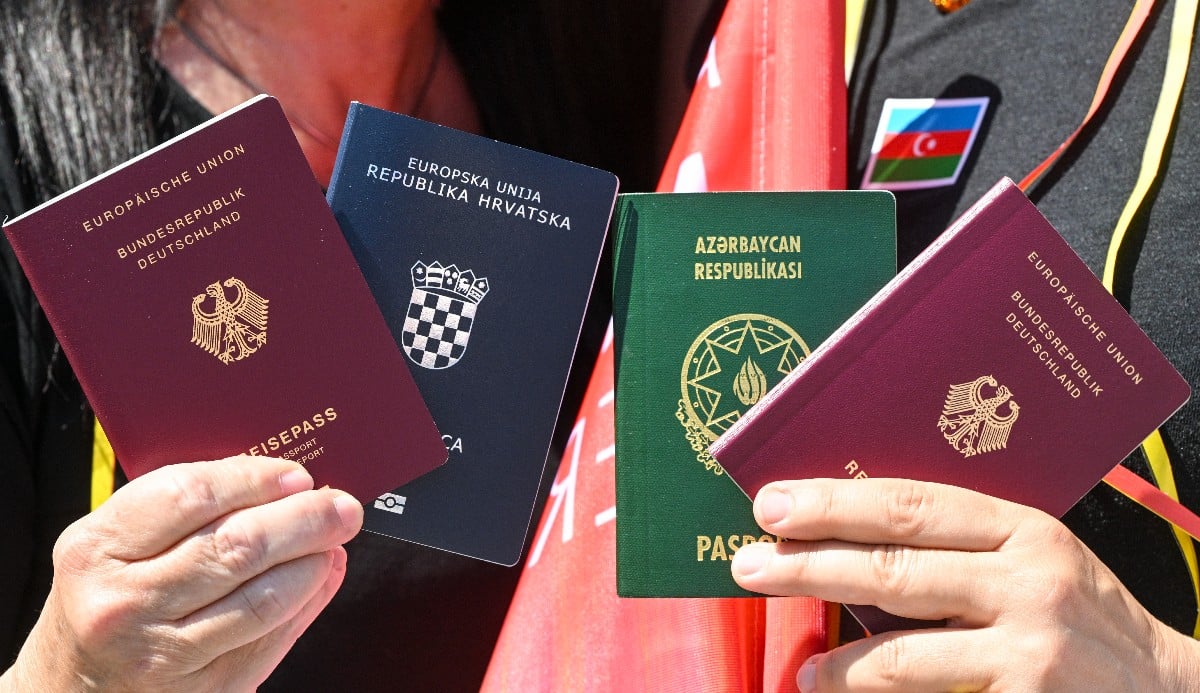A month ago, on December 17th, the national Christian Democratic Union (CDU) party finalised the details of its joint election manifesto along with the Christian Social Union (CSU).
In it, the sister parties pledged an "anti-woke" agenda with an end to gender-neutral language and legal cannabis, set their sights on economic growth through tax reform and set a hardline course on migration.
On Monday, however, Bavaria's CSU plans to release a separate manifesto titled the 'Bavarian Agenda' that will lay out the party's own policies. According to the Münchener Merkur, which has seen the document, the manifesto has a lot in common with CDU/CSU one - but with some significant differences.
Most notably, the CSU are far more explicit about their plans for migration and naturalisation laws, with the party pledging to roll back the traffic-light coalition's citizenship reforms almost in their entirety.
The previous government, led by the Social Democrats, Greens and Free Democrats, overhauled citizenship laws to allow people to naturalise after five years instead of the previous eight, and after three years if the applicant has excellent integration achievements and fluent German. Dual citizenship is also permitted under the reform.
In response to the wide-ranging reform, the CSU has toughened up their tone on naturalisation and explicitly called for a return to the previous residence requirements.
"Naturalisation may only be granted after eight years", the party reportedly writes in its manifesto, and only with good integration, no criminal record and an adequate job.
Like the CDU, the CSU also want to end the universal right to dual citizenship that was brought in by the now-defunct traffic light coalition.
READ ALSO: Why is dual citizenship still so controversial in Germany?
While the joint CDU/CSU manifesto calls for an end to fast-track citizenship, there is no explicit mention of how long foreigners should live in the country before obtaining a passport.
The CSU, meanwhile, are calling for a full revocation of the law and a return to the previous status quo.
Hardline residence and asylum laws
Beyond candidates for naturalisation, the CSU also had tough words for people hoping to move to Germany in the future.
"No immigration into our social systems," the manifesto states. "The prerequisite for a permanent residence permit must be an independent means of subsistence."
Currently, applicants for most visa and residence permit types already have to prove that they can support themselves independently of the state, but it seems that the Bavarian party want to tighten this up even more.
On asylum, meanwhile, the party has a wide-ranging reform in mind that echoes many of the policies of the far-right Alternative for Germany (AfD).

As well as rejections at the border, the CSU wants to rely on third countries to take unwanted asylum seekers, increase the number of so-called "safe countries of origin", and place migrants on deportation lists in indefinite detainment until they can be removed from the country.
Meanwhile, benefits should be limited to just "bed, bread and soap" for people who have had their asylum claims rejected and new Ukrainian refugees should receive basic asylum support rather than the more generous Bürgergeld, the party writes.
Defending revocation of citizenship
While the CSU looks set to take an even more explicit and severe line on immigration, the CDU has also put foreigners in the crosshairs in recent election campaigning.
Most recently, CDU leader and chancellor candidate Friedrich Merz came under fire for the party's plans to revoke citizenship from dual nationals who commit crimes.
READ ALSO: When can your German citizenship revoked?
According the Interior Ministry, this would contravene the fundamental rights set out in Germany's Basic Law.

In response to his critics, Merz has doubled down on the policy, claiming that it wouldn't apply to "well-integrated" foreigners and would only affect those who commit crimes.
He had previously claimed that dual nationality "creates too many problems in Germany".
Nevertheless, human rights and refugee advocacy groups have raised concerns that the tougher tone on immigration is fuelling the rise of the populist far-right.
READ ALSO: How the conservatives want to gut Germany's citizenship law
Speaking to the Funke Mediengruppe in early January, refugee aid group Pro Asyl accused the CDU and CSU parties of becoming "radicalised" on immigration.
"It is extremely worrying that the CDU/CSU parties are disregarding fundamental and human rights in many of their demands in order to woo voters from right-wing parties," Pro Asyl rights expert Wiebke Judith told reporters.
Such policies lead to an erosion of basic principles such as the rule of law, human dignity and human rights, she added.
These principles are set out in Germany's constitution, which was formulated after the Second World War in response to the horrors of Nazism.
Could these changes actually happen?
That all depends on how well the CDU and CSU perform in the upcoming federal elections on February 23rd.
Over the past weeks and months, the centre-right alliance has been consistently leading in the polls at 30 percent or higher, with Merz even claiming his party is on-track to get 35 percent of the vote.
Though a lot could change in the next five weeks leading up the election, the current expectation is that the next government will be led by the CDU and CSU.
READ ALSO: Will Germany's dual citizenship law remain after new elections?
Pending a miraculous jump in support, however, they would have to rely on a junior coalition partner - most likely the Greens or the Social Democrats (SPD).
Though the AfD could emerge as the second largest party in parliament, the CDU/CSU have ruled out working with them in a coalition.
Both the SPD and Greens have a far more liberal view of immigration than the CDU and CSU - and they were also the architects of the dual nationality law.
In other words, the CDU/CSU would need to find a compromise position, potentially taking a softer line on citizenship in return for tougher asylum laws.

Comments